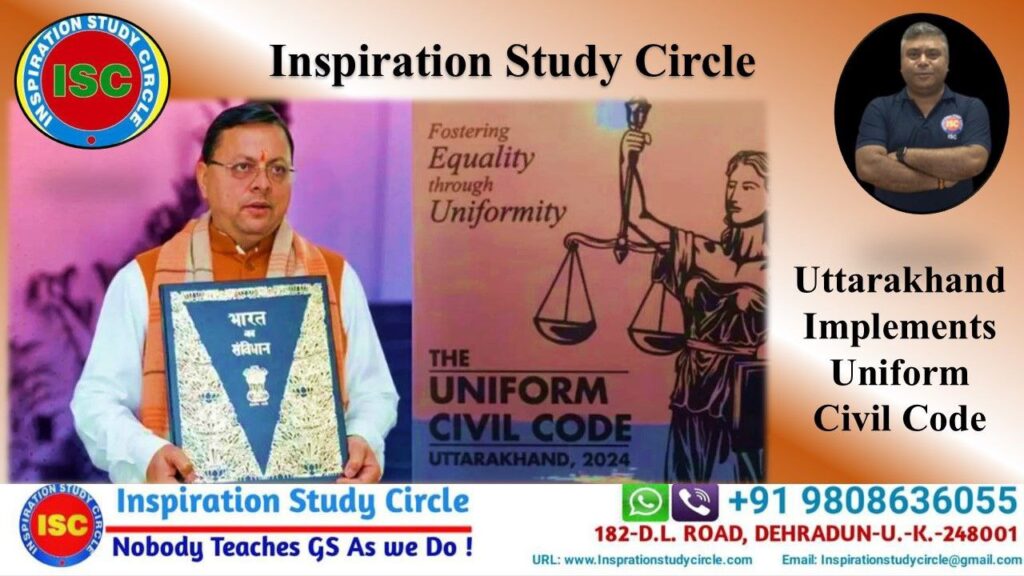
UPPSC- 2026 Calendar Released
UPPSC- 2026 Calendar Released Table of Contents UPPSC- 2026 Calendar Released Brought to you by Inspiration Study Circle UPPSC- 2026

Uttarakhand is the first state in India to enact a law on the Uniform Civil Code. Chief Minister Pushkar Singh Dhami described it as a “historic moment” for the nation.
The Uniform Civil Code of Uttarakhand Act, 2024, is legislation designed to establish a unified set of personal laws governing matters such as marriage, divorce, adoption, inheritance, and maintenance for all citizens of Uttarakhand, irrespective of their religion, gender, caste, or sex.
The Uniform Civil Code is a code of conduct that simply means “One Country, One Law”. If applied, the UCC will replace various laws currently in force, including the Hindu Marriage Act, the Hindu Succession Act, the Indian Divorce Act, the Parsi Marriage Act, the Indian Christian Marriage Act, and the Divorce Act.
The UCC applies uniform laws in marriage, divorce, inheritance, and adoption.
Implementation of the Uniform Civil Code in India will prevent different sections of society from being inconsistent. They will then be treated uniformly according to the national civil code regardless of their religion.
Most aspirants focus only on standard books, completing the UPSC syllabus, revising and retaining the concepts, and checking various study materials and online resources. However, due to time constraints, there is no quality check on the matter learned and studied all year. UPSC preparation will not work if you prepare without evaluating your knowledge. Self-examination and testing are as important as UPSC exam preparation.
Hence, a good and clear Test Series will steer your preparation in the correct direction. For the coming UPSC- CSE 2024, it is very important to test yourself in various stages of preparation, i.e., for prelims, mains, and the interview thereafter.
Inspiration Study Circle puts forward a detailed Test Series for UPSC 2024 in Dehradun itself. We will provide a separate test series for Prelims, for mains, and interview sessions for the ones appearing.
Article 44 (Part IV) of the Constitution states that “The State shall endeavour to secure the citizen a Uniform Civil Code throughout the territory of India.”
The UCC comes under Article 44 of the Constitution of India. Article 44 of the constitution simulates the Directive Principles of the State Policy. It expects the Indian States to apply and practice a law common to all Indian citizens simultaneously adhering to national policies.
The Uniform Civil Code, which has not been applied yet, is a contentious issue in India. There is a side of debaters manifesting that UCC might promote equality and secularism while the opponents believe it would interfere with religious freedoms and cultural practices.
Article 44 of the Constitution of India states that the State shall endeavor to implement a Uniform Civil Code. The implementation of the Uniform Civil Code in Uttarakhand was one of the key promises made by the Bharatiya Janata Party during the 2022 Uttarakhand Legislative Assembly elections.
In 2022, the Government of Uttarakhand established a five-member expert committee, chaired by former Supreme Court judge Ranjana Prakash Desai, to study and draft a Uniform Civil Code (UCC) law for the state.
The committee sought public suggestions and received a total of 60,810 responses regarding the drafting and implementation of the Uniform Civil Code. On 2 February 2024, the committee submitted its report to Chief Minister Pushkar Singh Dhami.
On 4 February 2024, the Council of Ministers, led by Chief Minister Pushkar Singh Dhami, approved the committee’s report.
The Uniform Civil Code Act, 2024, implemented in Uttarakhand, applies to all individuals residing in the state, except members of Scheduled Tribes. Below is a breakdown of its key provisions:
Marriage and Divorce:
Inheritance and Succession:
Live-in Relationships:
Additional Provisions:
Exemptions:
There were varied opinions about the Uniform Civil Code within the constituent assembly. The Uniform Civil Code saw a detailed discussion at the Constituent Assembly on 23rd November 1948.
Various suggestions to amend the laws related to religious beliefs and practices were made. Mehboob Ali Baig Sahib Bahadur, Naziruddin Ahmed, Muhammad Ismail, and Husain Imam were among the Muslim members who moved these amendments.
The counter-arguments were made by B. R. Ambedkar, K. M. Munshi, and Alladi Krishnaswamy Ayyar.
At the end of the session, the counter-argument that a uniform law would provide a foundation of conformity and equality to all the sections of society won, making Uniform Civil Code a part of the Constitution.
The governance of India has been rolling over various personal laws for different communities and religions. They have been subjected to the matters of marriage, divorce, adoption, and inheritance, under the Concurrent list of the Indian constitution. Some of these include the following:
The Uniform Civil Code has been at the centre stage for many debates and sessions in India since the post-independence era. Many social and political reform movements, as well as amendments, have projected its time-honored demand. While on the other hand, certain disapprovals and quashes have contributed to its opposition, thereafter playing veto in its execution.
Goa was the only state in India to have adopted a Uniform civil code before Independence. The Goa Civil Code is designed on the lines of the Portuguese Civil Code of 1867. Some disciplines of the Goa Civil Code are:
It would not be wrong to say that the Goa Civil Code does have some anomalies and is not completely uniform, however, it is far more just in terms of equality under various social matters.
India is a land of diversity. Cultural, political, regional, linguistic, philosophical, economic, religious, you name it, we have it.
As quoted by Vinay Sahasrabuddhe, “India is a civilizational nation in the world with a unique idea of philosophical foundations. For us, spiritual democracy exists and is firm and our ekam sat, vipra bahuda vadanti approach rejects any monopolistic approach.
It is high that we need to realize the objectives of Directive Principles of State Policy and at the same time maintain the much-required uniformity of the nation in terms of social and personal laws.
We need to arrive at an intellectual consensus that is socially empowering, politically correct, humanly possible, and religiously available for the nation.

UPPSC- 2026 Calendar Released Table of Contents UPPSC- 2026 Calendar Released Brought to you by Inspiration Study Circle UPPSC- 2026

Inspiration Study Circle: UPSC CSE 2026 Notification Out Table of Contents Inspiration Study Circle: UPSC CSE 2026 Notification Out UPSC

Explained: Union Budget 2026- 27 and the Economic Survey 2025-26 Table of Contents Union Budget 2026- 27 and the Economic

Target UPSC 2026: Best UPSC 2026 Coaching Table of Contents Inspiration Study Circle- Best UPSC 2026 Coaching UPSC Exam 2026

UPSC 2026 Notification Postponed Table of Contents UPSC 2026 Notification Postponed UPSC Exam 2026 is an All-India Civil Services Exam

Inspiration Study Circle- Best UPSC 2027 Coaching Table of Contents Inspiration Study Circle- Best UPSC 2027 Coaching UPSC Exam 2027